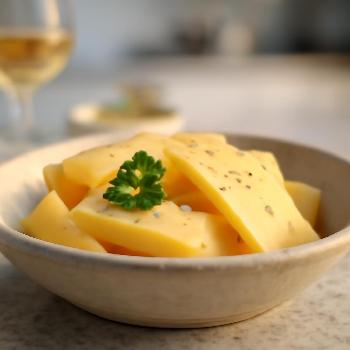Cooking Tips > Ingredients & Substitutes > Ingredient Clarifications > What is gouda cheese?
What is Gouda Cheese?
Gouda is a semi-hard cheese originating from the Netherlands, specifically the city of Gouda. It's renowned for its smooth, creamy texture and nutty, caramel-like flavor, which intensifies with age. This tutorial will delve into the characteristics of Gouda cheese, exploring its different varieties, uses, and potential substitutes.

Origins and Production
Gouda's history stretches back to the 12th century, making it one of the oldest cheeses still produced today. While the name comes from the city of Gouda, where it was historically traded, the cheese itself is made throughout the Netherlands and in many other countries. The traditional production process involves using cow's milk, which is then curdled, washed to remove some of the lactose, pressed into molds, and brined. The cheese is then aged for varying periods, influencing its final flavor and texture.
Flavor Profile and Texture
Young Gouda (also known as 'Jonge Gouda') typically has a mild, slightly sweet, and creamy flavor with a smooth, almost buttery texture. As it ages, the flavor becomes more complex and intense, developing nutty and caramel notes. Aged Gouda (often labeled 'Oude Gouda') can be quite firm and develop small crystalline structures (calcium lactate crystals) that provide a delightful crunch. The rind, often waxed, is not typically eaten.
Varieties of Gouda
Gouda cheese comes in a wide range of varieties, differentiated by age and added flavorings:
Culinary Uses
Gouda is a versatile cheese suitable for various culinary applications:
Substitutes for Gouda
If Gouda is unavailable, several cheeses can be used as substitutes, depending on the desired flavor and texture:
FAQ
-
How should Gouda cheese be stored?
Gouda cheese should be stored in the refrigerator, wrapped tightly in cheese paper or plastic wrap to prevent it from drying out. Properly stored, it can last for several weeks.
-
Can Gouda cheese be frozen?
While Gouda can be frozen, it may affect the texture, making it slightly crumbly. It's best to use frozen Gouda in cooked dishes rather than for snacking.
-
What are the white crystals sometimes found in aged Gouda?
These are calcium lactate crystals, which are a sign of aging and indicate high quality. They are perfectly safe to eat and add a pleasant crunch.
-
Is Gouda cheese vegetarian?
Many Gouda cheeses are made using animal rennet, which is not vegetarian. However, vegetarian versions using microbial rennet are also available. Check the label to confirm.
